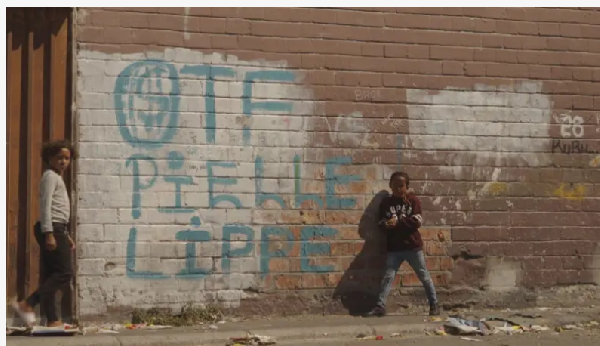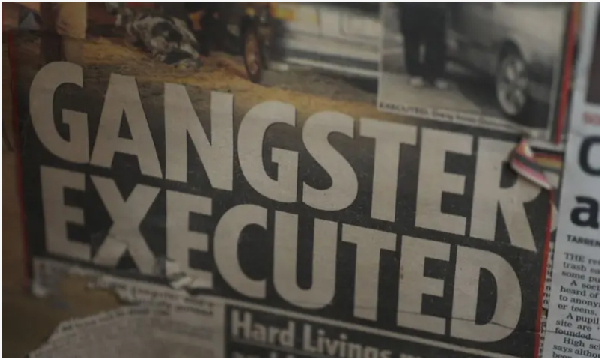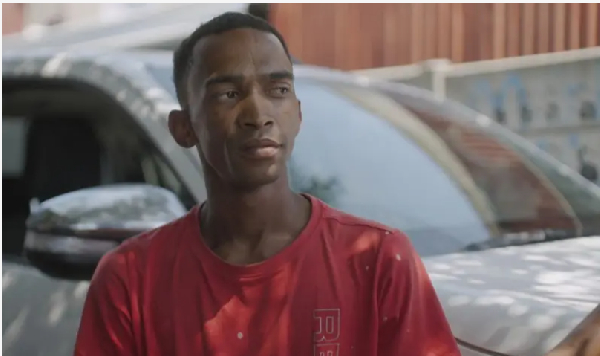Di father wey still dey in shock lie down on a small single bed and e point to two bullet holes for di wall of im house.
Dis na clear evidence of di moment wey destroy im family life forever.
Dem shoot Devon Africa four-year-old son, Davin, for February, e bin dey di middle of one crossfire shoot-out between criminals.
E be victim of di gang warfare wey dey disturb Cape Flats, di towns around Cape Town – di area na legacy of apartheid, wen dem force non-white population comot from di centre of di wealthy city go di under-resourced outskirts.
“Dis na di bullet hole here,” e tok. “Dis na wia e sleep.”
Di family bin already don endure unspeakable horror.
Davin older sister, Kelly Amber, die two years earlier, dem shoot am too as rivals fire gun at each oda. She be 12.
Now, na only one pikin remain for Devon and im wife, Undean, dia youngest daughter.
“She ask me: ‘Wia my brother dey?” Undean tok. “So I tell her say e dey wit Jesus for daddy heart and for my heart.”
These murders happun for one area known as Wesbank, but many oda families across di wider Cape Flats area don at one time endure similar nightmares, despite assurances by di police say dem go increase patrols.
Di numbers tell horrifying story. Di Western Cape province – wia di Cape Flats dey – consistently see majority of gang-related murders for South Africa, according to di police.
Officially, dis na policing priority for di government. President Cyril Ramaphosa set up one special unit to fight gang violence for 2018, e also briefly deploy army to di area di following year, but di problem no stop, and di killings continue.
“Whole history and generations of pipo wey dem born into these gangs dey,” Gareth Newham, head of di Justice and Violence Prevention programme for di Institute for Security Studies for Johannesburg.
“[Dem] flourish for areas wey di state don abandon or areas wey dey underdeveloped. Di gangs dey provide a form of social structure wey dey provide services to di communities wey di state no dey do anytin for. Dem dey provide food for homes. Money for electricity. Money for transport or funerals. These gangs even dey pay school fees.”
Dem dey among di pipo for di community and “dat na why e dey very difficult for di police to tackle dem… e mean say dem fit use non-gang members’ houses to store drugs and store weapons”.
But pipo dey wey dey try tackle di issue.
Fifteen kilometres (nine miles) away from Wesbank na Hanover Park wia Pastor Craven Engel dey glued to im mobile phone almost all day, every day in im quest for peace.
Im mission na to mediate in gang conflicts to stop dis violence and di killings, wey profitable trade in drugs dey ginger. Im and im team dey try follow one basic formula: detection, interruption and changing mindsets.
“Hanover Park no really get any economy to tok of,” Pastor Engel. “Most of di economy na from di drug culture. Dat na di biggest economy.”
Pastor Engel say dem no fit overlook di impact of di apartheid for di area but neither can generational trauma – manifested as drug addiction and then family breakdown.
“Di substance [drug] create unemployment, di substance create robbery, e create gang fights sake of turfs. So, di substance dey di middle of so many of di atrocities within di community,” Pastor Engel tok. E estimate say around 70% of local children wey dey there dey live wit some kind of addiction.
Dis community of around 50,000 pipo gatz endure shootings and stabbings almost daily. And most time, na young pipo dey do di killing and na dem dey die.
“Di policing approach alone no fit solve di problem bicos you fit arrest pipo bicos dem be members of di members, for having guns and for shootings and murders. Dem go go prison, but then, younger members go replace dem. And dat dey create a whole different set of problems. E dey likely say dem go get into fights ova territory and turf,” Mr Newham tok.
“How dem dey shoot pikin seven times for head or three times for im back? How stray bullet take dey hit pikin?” Pastor Engel ask.
On im phone, e call community leaders and gang kingpins, wey dey constantly try to reduce di violence. Wen BBC Africa Eye visit am, e bin dey try broker one ceasefire between two warring gangs – and e bin manage to reach di jailed leader of one of dem.
“If I want something to happun then e go happun. You understand pastor?” di gang boss tok for phone. “But I fit tell you one thing. I be pesin wey like to fight back if I come under fire.”
Threats. Even from behind bars.
But Pastor Engel no dey give up. E dey highly visible for im community, weda for di house of a parishioner or bifor im large and loud congregation for di pulpit on a Sunday.
“I think wetin make am dey very, very terrible now now na say more children dey involved for di gangs, bicos di gangs dey recruit between diages of eight and 15 years old,” e tok.
Di programme e dey run bin dey receive government money, but di funds no dey again. To cut off di supply lines and protect di innocent, e go meet victims and perpetrators anywhere and at any time.
E dey also send rehabilitated gang members to negotiate directly wit warring factions. Those wey dey live on di edge of death know how important e dey to push for peace instead.
Glenn Hans na one such person. E dey meet wit rival gangs to convince dem to honour a ceasefire. “I bin also dey dis game. As long as you make decision say you wan be better pesin. Dat’s all,” e tell one group of gang members.
One of dem get chilling response: “Di more we kill, di more ground we seize and di more ground we get, di more we fit build. So, for me to speak about peace – I no fit make dat kain decision bicos no be my decision to ensure peace.”
Di ceasefire wey dem eventually agree on bin last just for few days, shattered by di killing of two pipo for one drive-by shooting.
But some pipo wey don dey deep inside di conflict don get enough.
Fernando – or Nando – Johnston dey part of one gang called di Mongrels, and e dey try find way out wit di help of Pastor Engel.
Di pastor describe Mr Johnston as young pesin dem “born into di gang” since im whole family dey involved.
“For dis game na only two options dey – na either you go jail or you die, ” Oga Johnston tok.
“I really wan change direction and I believe say way out always dey. Dat na di reason I approach di pastor – to ask am if plan or way dey to take me.”
E go join one six- to 12-week programme of rehabilitation wey di pastor dey run and wey charitable donations dey fund wey dey designed to get pipo off drugs and into work.
“Di thing na you fit now start to dey build yourself up again,” Pastor Engel tell am. “You go fit get job and make money for yourself. Then you no go need hustle and scavenge around here anymore.”
“I ready to go, pastor,” Johnston tok as e ready to leave im battered and scarred community in search of a new path.
Pipo wey close to am don gada to wish am well. Im mother, Angeline April, hold back her tears, desperate say, dis time, her son go choose life. “Please just make di best of dis opportunity, Nando,” she tok.
“Yes mummy, I always make di best of a situation.”
“Fernando papa na gangster but my oda children papa na gentleman,” Mr Johnston mama tok.
“But bicos e be gangster, di children also chook body for gangsterism despite say I constantly dey warn dem. E no easy to raise four boys on my own, you know. I always dey encourage am to change, bicos I love am well-well.”
And so far so good for Mr Johnston. Two weeks afta e start di programme, e still dey there.
“Nando dey stabilize. E dey for works programme. E dey see im family, e dey see im children. We allow am go house and e come back and we test am and no find drugs for im system,” Pastor Engel tok.
Hope na rare commodity for here, but sometimes e dey spring through di cracks for di streets wey don see so much trauma.
No be all streets, though. Very little hope dey found at Devon Africa and Undean Koopman house, wey siddon for di middle of battlefield.
Di cycle of killings and retaliation wey don hit di area wey dey di edges of dis beautiful South African city dey overwhelming for many of those wey just dey struggle to survive.
And those caught in the middle often gatz make impossible choices.
“Community members, even if dem dey opposed to di gangs, are not necessarily pro-police for two reasons,” Mr Newham tok.
“One na say dem no know if police go come if dem call dem. And if dem call di police, dem no know if di police officers dey corrupt. Pipo no understand di scale of di challenge for South Africa.”
Sentiments reflected by di peacemakers on di frontlines for dis war. “Nobody go come from anywhere to help or save us. Not from overseas. Not from our local government. Nobody go come wit magic wand to cure di Cape Flats,” Pastor Engel tok.
“As individuals we gatz dey determined to build up resilience, create hope for our pipo and grow. Bicos politics clearly don fail us.”

Three decades afta di end of apartheid di legacy of di system, wey keep pipo wey no be white separate and poor, still dey live on for Cape Flats

One newspaper wey dey pinned to di wall of Pastor Engel office na reminder of di killing of one notorious gang leader for 2019

Nando Johnston say im wan find way out of di gang life
